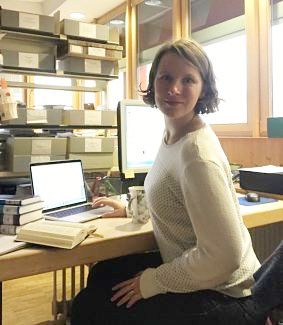Anna Nowicki is conducting research in Austria this academic year and sent us this report.

“I came to Innsbruck in the beginning of October 2017, supported by the Franz-Werfel Scholarship to write and to do research for my dissertation. Prof. Ulrike Tanzer, a well-known Marie von Ebner-Eschenbach scholar, and her staff at the Brenner Institute gave me a warm and heartfelt welcome and continue to be extremely helpful. The Brenner Institute, located in the heart of Innsbruck, surrounded by serene mountain views, houses not only the archive of the cultural journal “Der Brenner” founded by Ludwig von Ficker, but also the biggest part of Georg Trakl’s literary estate. Its resources, as well as the collections at the library of the University of Innsbruck, have proven to be very useful for my research.
My dissertation is looking at Austrian and German literature from the second half of the 19th century and examines the way disability is portrayed, as well as the role people with disabilities play within and for their families. Specifically, I am interested in the development of norms and ideologies surrounding the body of disabled persons and their families. The University of Innsbruck and the Brenner Archive have been an ideal working place for this endeavor; through Prof. Tanzer, I was able to join the newly found Doktoratskolleg Austrian Studies, where I will present and receive feedback on my dissertation project in a couple of weeks. Additionally, the University of Innsbruck is one of the leading universities in Austria when it comes to Disability Studies. At the moment I am organizing a workshop with Prof. Lisa Pfahl on intersectionality in Disability Studies and I have also been able to attend the annual DISTA (Disability Studies Austria) conference here at Innsbruck.
I am very thankful for the support of the Franz-Werfel Scholarship and the German Department of WashU, especially Prof. Tatlock for her willingness to advise me over Skype so that I come to Innsbruck for my dissertation work and I cannot recommend the University of Innsbruck and the Brenner Institute enough.




